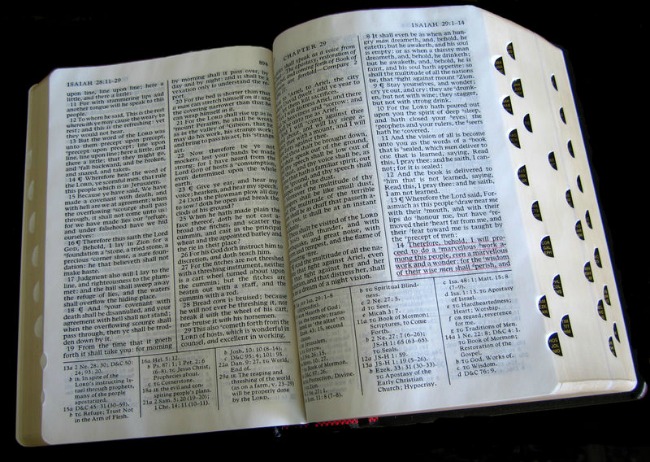Question
Gramps,
I was reading Isaiah 48:8 where it says, “for I knew that thou wouldest deal very treacherously, and wast called a transgressor from the womb.” There was also I cross reference to Isaiah 58:3 which says roughly the same thing. I know that little children can not sin, so what is Isaiah trying to tell us? How can one be evil from the womb?
Wyatt
Answer
Wyatt,
I can understand your confusion. Isaiah can be a difficult book to understand. From the Old Testament Student Manual Kings-Malachi, Supplement E, “Understanding Isaiah”, we learn one of the keys to understanding Isaiah: “Isaiah’s book is written in a poetic, literary style that makes extensive use of symbolism to communicate to those who are spiritually mature.”
Further, from chapter 17 of this manual, we learn that Isaiah 48:1-8 is about Judah’s Apostasy. Verses 1 and 2 describe how the people have gone astray. Verses 3 and 5-8 describe how the Lord demonstrated “His powers of omniscience.” And in verses 4 and 8 we understand the Lord’s reason for demonstrating his power – because the people are apostate, and the Lord knows it. The wording of verse 8 can be seen as stylistic, and perhaps used because Judah have been in this state long enough that new generations are taught false traditions “from the womb”.
Regarding Psalms 58:3, remember the Psalms are a form of poetry, and poetry often uses strong imagery to make a point. It’s probable that this verse simply describes how quick Israel are forget the Lord and go astray. We also know that many plain and precious things were lost from the bible, and this could be a result of that. We know from modern revelation that children are born innocent (D&C 93:38, Moroni 8:8, 22).
The only other scripture which comes close to the idea of a person being “evil from the womb” is Moses 6:55 “And the Lord spake unto Adam, saying: Inasmuch as thy children are conceived in sin, even so when they begin to grow up, sin conceiveth in their hearts, and they taste the bitter, that they may know to prize the good.” From the Pearl of Great Price Student Manual: ‘Elder Bruce R. McConkie indicated that the phrase “conceived in sin” means “born into a world of sin” (see A New Witness for the Articles of Faith, 101).’
Finally, lest it seem that every individual in Israel or Judah was under this condemnation, consider this quote from Approaching Zion, chapter 14, by Hugh Nibley regarding prophecies of group behavior:
Prophecy tells us that things are going to change and that there is nothing we can do to stop it. Certain things are certainly going to happen. Must we therefore resign ourselves to fate? Not at all. There is a vital rule that leaves the door wide open to effective individual repentance and escape. We have Professor Heisenberg to thank for that. He found that though you can predict with absolute certainty how masses of particles are going to act, you can never predict how any one particle is going to behave. That is the Heisenberg Uncertainty Principle, which used to be called “the free will of the atom.” The single particle is unpredictable; only the mass is absolutely bound to behave according to the unimpeachable laws of physics. In the same way one can prophesy with absolute certainty what a nation or people or society is going to do: you can talk about aggregates and predict the behavior of masses, but you can never deny any individual the freedom to repent and go the other way. “Thou shalt not follow a multitude to do evil.” The prophets and Professor Heisenberg show us the way out. You do not have to wait for the group to change, for the society to repent, nor do you have to change your ways to comply with theirs; the individual is free to ignore the multitude, and only he is free.
While God knows all and warns us through prophecies such as this one in Isaiah 48, we each still have our agency and the option to do good, even if the entire nation around us is prophesied to fall into sin. This is the beauty of the Savior’s Atonement.
Gramps







